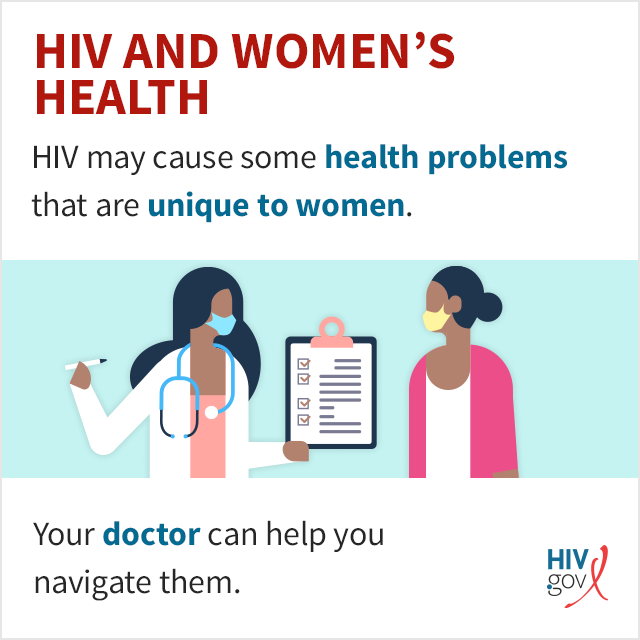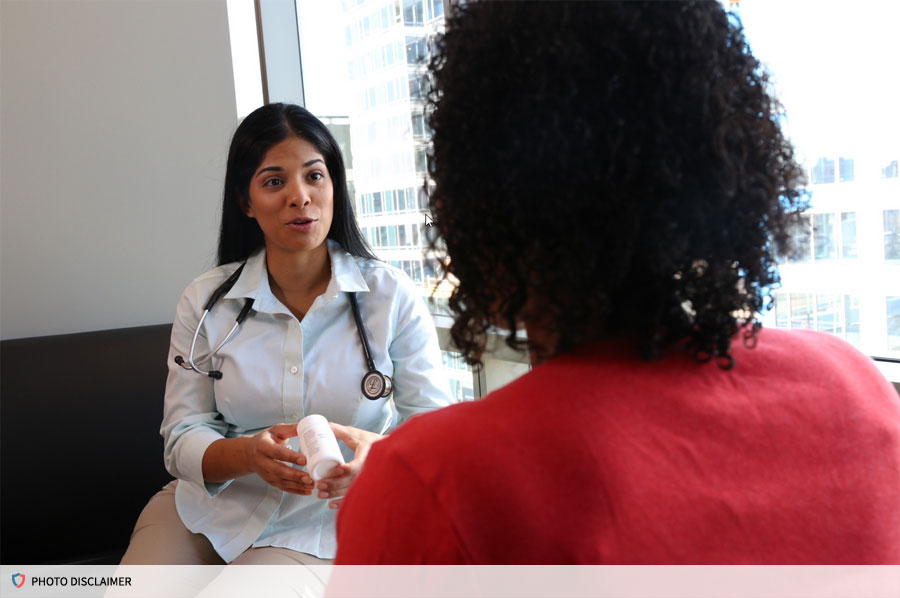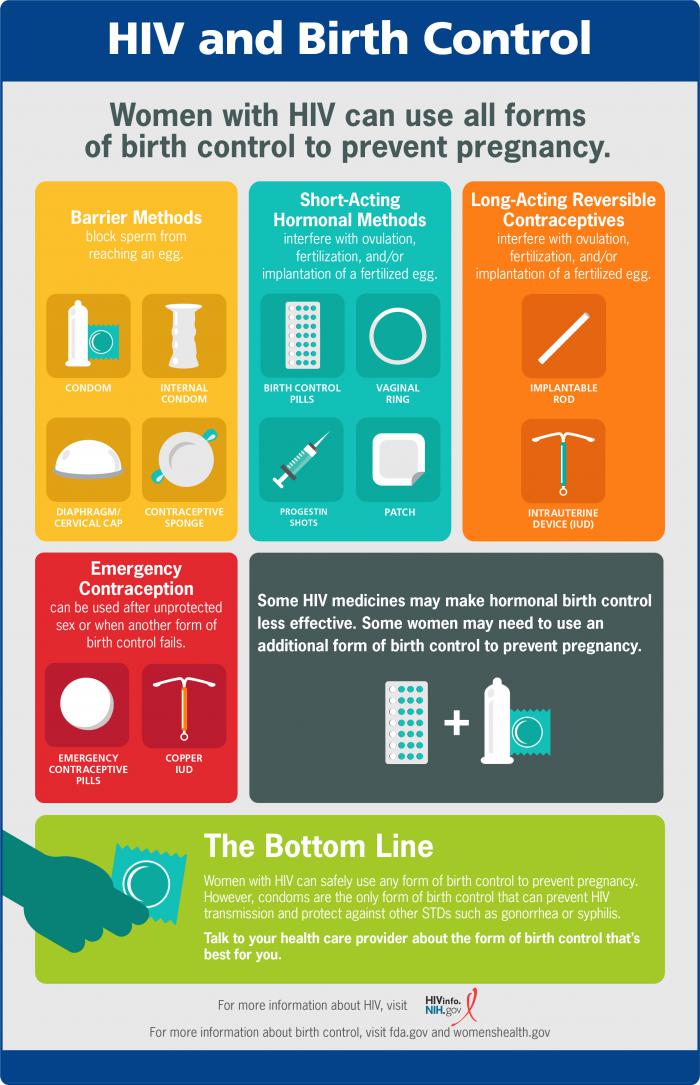HIV and Women's Health Issues

How Does HIV Affect Women Differently?
HIV may cause some health problems that are unique to women, such as:
- Gynecological health issues
- Increased risk of cervical cancer
- Increased risk of heart disease
- HIV medicine side effects and drug interactions
- Aging-related issues
Pregnancy and birth control also require careful management with a health care provider.
The good news is that women with HIV who take HIV medicine (called antiretroviral therapy or ART) exactly as prescribed and get and keep an undetectable viral load can live long and healthy lives and have will not transmit HIV to their HIV-negative partners through sex. An undetectable viral load is a level of HIV in your blood so low that a standard lab test can’t detect it. Learn more about the health and prevention benefits of viral suppression and having an undetectable viral load.
Gynecological Health Issues and HIV
Gynecological problems are common among women with HIV. Some of the issues women may experience are:
- Problems related to sexually transmitted diseases (STDs)—STD screening and treatment are important for all women. However, they are especially important for women with HIV because some STDs, like genital herpes, pelvic inflammatory disease (PID), and chancroid, can happen more often and be more severe and/or harder to treat. Also, having HIV and other STDs may increase the risk of HIV transmission to sexual partners.
- Vaginal yeast infections—In women with HIV, vaginal yeast infections can occur more frequently and be harder to treat. Recurring vaginal yeast infections (those that happen at least four times a year) can happen more often in women with advanced HIV or AIDS.
- Bacterial vaginosis (BV)—BV is a condition caused by changes in the amount of certain types of bacteria found in the vagina. BV is more common in women with HIV and may be harder to treat.
- Menstrual cycle problems—Women with HIV may experience missed periods, lighter or heavier bleeding, or more severe premenstrual syndrome.
Treatment is available for these health conditions. Talk to your health care team about treatment options that are right for you.
Cervical Cancer and HIV
Women with HIV have a higher risk of cervical cancer. It is important that they be screened regularly for this disease.
Cervical cancer starts in the cervix, the lower, narrow part of the uterus (the womb). It is an AIDS-defining cancer. That means that a diagnosis of cervical cancer marks the point at which a person’s HIV infection has progressed to AIDS.
Most cases of cervical cancer are caused by the human papillomavirus (HPV). There are many different types of HPV, with some types that cause cervical cancer and other types that do not.
The types of HPV that cause cervical cancer are more common in women with HIV. Cervical cancer is largely preventable through regular Pap tests and HPV vaccination. For this reason, women with HIV need to get regular Pap tests to screen for changing cervical cells before they turn into cancer. Talk to your health care provider about the Pap test schedule that is right for you.
The HPV vaccine is recommended for women (and men) with HIV through age 26 if they have not already been vaccinated. Some adults ages 27-45 who have not already been vaccinated might choose to get the HPV vaccine after speaking with their doctor about their risk for new HPV infections and possible benefits of vaccination.
HIV Medicine Side Effects and Drug Interactions
HIV medicine works as well for women as it does for men. However, some medicines can cause different side effects in women than men. For example, the HIV medicine ritonavir (also called Norvir or RTV) may cause more nausea and vomiting in women. It is sometimes prescribed to help other HIV medicines work better.
HIV medicines can also put women at higher risk than men of getting fat buildup throughout their bodies or of having pancreas problems.
In addition, HIV medicines can interact with other drugs, which can harm you or make your HIV medicines less effective. These include:
- Prescribed medications
- Over-the-counter medicines
- Recreational drugs and alcohol
- Herbal remedies
If you are taking HIV medicines and have problems with any side effects or questions about drug interactions, talk to your health care provider or pharmacist to find solutions that work for you. Do NOT cut down on, skip, or stop taking your HIV medicines unless your provider tells you to.
Women’s Aging and HIV
Thanks to effective HIV treatment, women with HIV are living longer lives. That also means that as they age, they face the same health problems that many other older women do, such as heart disease, diabetes, high blood pressure, arthritis, and some cancers.
Women with HIV also may face also other health concerns as they age. These include:
- Menopause—Women with HIV may enter menopause younger or have more severe hot flashes than women who do not have HIV. Researchers also think the drop in the female hormone estrogen after menopause may affect women’s CD4 counts.
- Osteoporosis—Osteoporosis is a disease that causes bones to become weak and easy to break. It is a concern for all older women, but especially for women with HIV. Bone loss occurs faster in women (and men) living with HIV than in people who do not have HIV. Some HIV medicines may also increase the risk of osteoporosis.
If you have questions about symptoms of the menopause or about osteoporosis, talk to your health care team.
Heart Disease and HIV

HIV-related heart disease is a leading cause of death among people living with HIV—even when they are on consistent, effective HIV treatment.
The risk of heart attack is especially a concern for women. Women living with HIV are three times more likely to have a heart attack than women without HIV.
Research is underway to learn how factors unique to women with HIV affect heart disease risk and what to do about it.
Pregnancy and HIV
Women with HIV can have healthy pregnancies. But some may need to switch HIV medications. Talk with your provider if you are thinking of planning a pregnancy, including about how to prevent HIV transmission if your partner is HIV-negative.
In addition, women with HIV can pass the virus to their baby during pregnancy, childbirth, or breastfeeding. The good news is that there are ways to lower the risk of passing HIV to your unborn baby to 1% or less and protect your own health.
Infant Feeding and HIV
If you have HIV, the current recommendation in the United States supports shared decision-making between you and your health care provider regarding infant feeding. Taking HIV medicine and keeping an undetectable viral load substantially decreases your risk of transmitting HIV to your baby through breastfeeding to less than 1%. However, the risk is not zero. Properly prepared infant formula or banked donor human breastmilk are alternative options that eliminate the risk of transmission through breastfeeding. If you are pregnant or thinking of becoming pregnant, talk to your health care provider as early as possible about what infant feeding choice is right for you. Learn more.
Birth Control and HIV
Women with HIV can safely use any form of birth control to prevent pregnancy. But some HIV medicines can reduce the effectiveness of hormonal contraceptives, such as birth control pills, patches, rings, or implants. This can raise the risk for pregnancy. Women taking certain HIV medicines may have to use an additional or different form of birth control. Talk to your health care provider about which form of birth control is right for you.
Also, be aware: using condoms the right way every time you have sex can help reduce your risk of getting STDs such as gonorrhea and syphilis.
